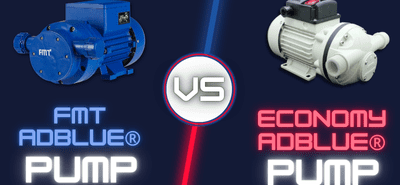The Importance of Regular Fuel Filter Maintenance
Filtering your fuel is crucial to prevent particle contaminants or water from entering storage tanks or vehicles. While fuel may appear clean to us, it can still contain small particles such as debris or other contaminants. Even the smallest contaminants can build up causing major problems, so it’s essential to understand the potential impact. Contamination can cause blockages or damage to fuel system components in your vehicle fleet, making it vital to take measures to filter them out of your fuel dispensing system.
Understanding Fuel Filters
A new filter prevents dirt, debris, and other contaminants ensures that only clean fuel reaches your equipment and therefore prevents clogging your fuel lines and damaging your engine. This not only enhances performance but also prevents unexpected breakdowns.
Inline filters are specifically designed to be installed directly into the fuel delivery system, positioned between the tank and the pump or nozzle. The installation process involves fitting a permanent filter adaptor to the system, allowing for easy insertion of replaceable filters. Over time, these filters will naturally become clogged with debris or wear out, but they can be swapped out with minimal cost and effort.
The filtration efficiency you need depends on the liquid you’re dispensing and the application requirements. For instance:
- 10-micron filters are ideal for filtering petrol and diesel,
- 30-micron filters could be more effective for thicker liquid fuel oils or as part of staged filtration.
Staged filtration refers to a series of filters in series gradually reducing in micron size, this is helpful in particularly challenging systems so that the fine low micron filters are not getting clogged too quickly.
Choosing the right filter grade helps ensure the smooth operation of your equipment and reduces the risk of damage from contaminants. The micron rating refers to the size of the particles the filter can trap. The lower the micron rating, the smaller the particles it can capture. Check you fuel filter can meet the required fuel cleanliness for each application, this will be provided by the manufacturer.
We offer two types of filters, particulate only filters, which remove solid contaminants, or water block filters which remove solid contaminants but also have some water absorbing material, which helps to block small amounts of water(i.e. condensation) from passing through the fuel system.
Common filter types include plastic bowl filters and metal canister filters. The plastic bowl filters are easier to spot if there is a large deposit of water gathering or if there is a major problem with debris, the replacement elements are less expensive and most of the bowl filters we stock are fitted with a bottom plug for draining off fuel so that the element can be changed. The metal canister type do cost more to replace but could be seen as more durable which might be useful if positioned in an area subject to heavy traffic or activity.
Maximise Fuel System Efficiency and Cut Costs
- Increased fuel dispensing system longevity
Regularly replacing your fuel filter helps maximise your dispensing systems efficiency. A clean filter means the fuel dispensing pump can operate without much restriction. A blocked filter would cause the pump to bypass more fuel putting extra load on the motor and the pump internals.
- Lower Vehicle maintenance costs
By having a pre vehicle filter system you are reducing the need for more expensive vehicle repairs such as blocked injectors, fuel filter replacements(outside of normal service requirements) and even sediment build up in your vehicle fuel tank.
- Reduce filling time and increase productivity.
A well-maintained fuel filter helps keeps the fuel dispensing system running at optimal speed, reducing the time spent filling or attempting to fix issues arising from poor service patterns. The time you save can be spent more productively.
Inspect for signs of clogging:
- It may be time for a replacement if you notice reduced pump speed or increased noise when filling.
- If you are unsure about the condition of your fuel filter, use a professional mobile engineer as required.
In conclusion, replacing your fuel filter regularly is important for the maintenance of your fuel dispensing system and can save you money in the long run. Regular fuel filter maintenance can provide several benefits to your dispensing system, including increased longevity, lower vehicle maintenance costs, more efficient time management and more. We have a range of fuel filters & elements to ensure your system is running at its best. Our technical team are available to talk to if you require any more assistance or have any questions. Don’t hesitate to contact us.
Fuel Filters & Elements:
-
 Groz Filter Service Kit – Water Block£21.29 £25.55
Groz Filter Service Kit – Water Block£21.29 £25.55 -
 Groz Filter Service Kit – Particulate Only Element£19.13 £22.96
Groz Filter Service Kit – Particulate Only Element£19.13 £22.96 -
 Water Block Filter Element for Groz Fuel Filter£10.36 £12.43
Water Block Filter Element for Groz Fuel Filter£10.36 £12.43 -
 Groz Particulate Filter Element£8.20 £9.84
Groz Particulate Filter Element£8.20 £9.84 -
 Filter Strap Wrench – 160mm (6 3/4″)£9.28 £11.14
Filter Strap Wrench – 160mm (6 3/4″)£9.28 £11.14 -
 Filter Bowl Thread GreaseFrom £1.65 £1.98
Filter Bowl Thread GreaseFrom £1.65 £1.98 -
 Two Piece Filter Strap Wrench Set£11.40 £13.68
Two Piece Filter Strap Wrench Set£11.40 £13.68 -
 Gilbarco filter cannister – 10 micron Particulate OnlyFrom £9.00 £10.80
Gilbarco filter cannister – 10 micron Particulate OnlyFrom £9.00 £10.80 -
 Spare Gasket for Groz Filter£0.66 £0.79
Spare Gasket for Groz Filter£0.66 £0.79

